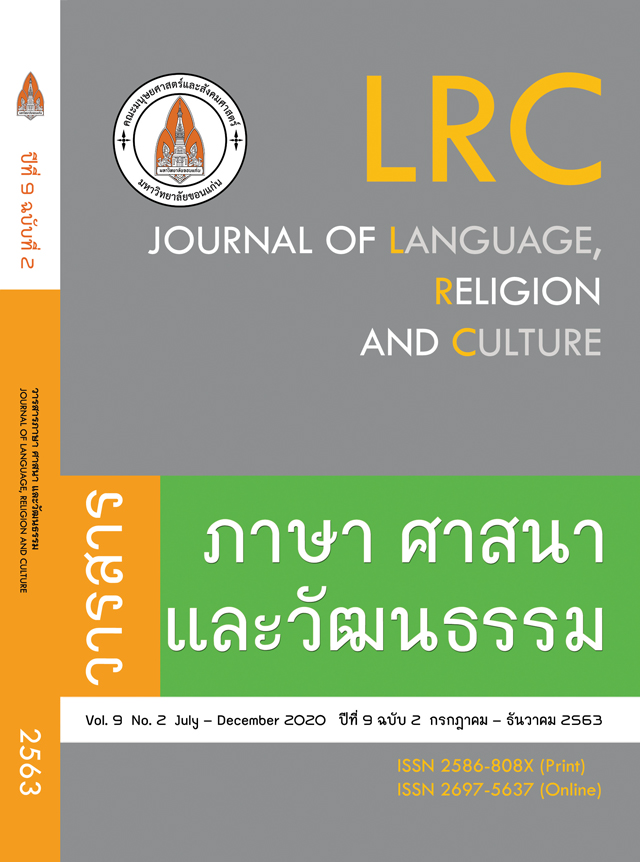แนวคิดฮินดูทวาในการเมืองอินเดีย
The Hindutva in Indian Politics
Keywords:
Bharatiya Janata Party, Hindutva, Rashtriya Swayamsevak SanghAbstract
This academic paper presented “The Hindutva in Indian Politics” that studied about the Hindutva is moved by the Hindu volunteer Rashtriya Swayamsevak Sangh (RSS), who need to protect the benefits of the Hinduism group. The Hindutva ideology is a political tool of RSS for building a ‘Pure Hindu State’ through ‘Hinduness’, ‘Hindi language’ and ‘Hindustan.’ Moreover, this ideology tried to protect and fight with the invader of the British Empire for freedom, to secure from the spreading and dependence of Christianity and Muslim idea, who both are the invader. This ideology was very strong from past to present and still influential on the Indian national political parties likes Bharatiya Jana Sangh (BJS), Janata Party (JP), and Bharatiya Janata Party (BJP), the current Indian government is led by Narendra Modi.
The study found that (i) Rashtriya Swayamsevak Sangh used the Hindutva Ideology’ and it is a good relation with Indian national political parties like Bharatiya Jana Sangh (BJS), Janata Party (JP), and especially, and Bharatiya Janata Party (BJP), which were influenced on the Indian Political Policy (ii) Hindu volunteer has two wings of ideology: a moderate with tolerance and extremist with militant but both tried to promote the religious doctrine to spread the ideology to the public society in the national and international network. (iii) Hindu volunteer is campaigning to build the ‘Pure Hindu State’ and calling to holy war to fight with the invaders. (iv) Hindu volunteers used a national law, education system to promote Hindutva and opposed ‘the plural society idea’ of Indian National Congress policy and Mahatma Gandhi. The study is very fruitful to give an understanding of the Hindutva to the people who are staying together in the plural society.
References
ประพันธ์ สามพายวรกิจ. (บรรณาธิการ). (2558). ถอดรหัสอินเดีย 2015. กรุงเทพฯ: สถานเอกอัครราชทูตไทย ประจำกรุงนิวเดลี ประเทศอินเดีย
Al-Jazeera. (2020). India restores internet in Kashmir after 7 months of blackout. March 5, 2020. สืบค้นเมื่อ 11 มีนาคม 2019 จาก https://www.aljazeera.com/news/2020/03/india-restores-internet-kashmir-7-months-blackout-200305053858356.html?fbclid=IwAR08ZD-epb_90rc-JLVK3uPPtsebMTm0eYTLLJNshMsnl0F7HkE5DJNMgqQ
Andersen, W., & Damle, S.D. (2019). Messengers of Hindu Nationalism: How the RSS Reshaped India. London: C. Hurst.
Baxter, C., Malik, Y. K., Kennedy, C. H., & Oberst, R. C. (1988). Government and Politics in South Asia. Lahore: Vanguard Books.
BBC News. (2005). Gujarat riot death toll revealed. May 11, 2005. สืบค้นเมื่อ 25 มีนาคม 2019 จาก http://news.bbc.co.uk/2/hi/south_asia/4536199.stm
Chatry, K. K. (2012). “Understanding the Religious Nature of Terrorism in India: Four Case System with An Analysis for Proposals and Resolution.” Doctor of Philosophy Thesis, Department of Theology and Religion, School of Historical Studies, College of Arts and Law, University of Birmingham.
Devare, A. (2009). Secularizing Religion: Hindu Extremism as a Modernist Discourse. International Political Sociology, 3(2), 156-175.
Dhillon, G. S. (2019). Hindutva agenda of the BJP. สืบค้นเมื่อ 15 มีนาคม 2019 จาก https://humanrightscommission.house.gov/sites/humanrightscommission.house.gov/files/documents/Presentation%20by%20Gurdarshan%20Sing%20Dhillon.pdf
Edited, C. J. (2007). Hindu Nationalism: A Reader. New Jersey: Princeton University Press.
Edited, M V. (2019). The BJP in Power: Indian Democracy and Religious Nationalism. Washington: Carnegie Endowment for International Peace.
Express News Service. (2020). Gujarat: 144 tribals ‘reconverted’ to Hinduism in Dang. The Indian Express. January 26, 2020. สืบค้นเมื่อ 24 มีนาคม 2019 จาก https://indianexpress.com/article/india/gujarat-144-tribals-reconverted-to-hinduism-in-dang-6235405/
Ganguly, S. (2014). "The Risks Ahead". Journal of Democracy, Johns Hopkins University Press. 25 (4), 56–60. สืบค้นเมื่อ 20 มีนาคม 2019 จาก https://muse.jhu.edu/article/556410
Gaur, A., Lotha, G. & Tikkanen, A. (2019). Bharatiya Janata Party. สืบค้นเมื่อ 23 กันยายน 2019 จาก https://www.britannica.com/topic/Bharatiya-Janata-Party#ref789897
Glock, C. Y., & Stark, R. (1965). Religion and society in tension. Chicago: Rand McNally.
Hindustan Times. (2014). ‘Ghar wapsi’ only way to end terror says BJP leader. December 25, 2014. สืบค้นเมื่อ 25 มีนาคม 2019 จากhttps://web.archive.org/web/20141229063904/http://www.hindustantimes.com/india-news/newdelhi/ghar-wapsi-only-way-to-end-terror-says-bjp-leader/article1-1300421.aspx
India Today Web Desk. (2017). 53 families converted to Hinduism: RSS in Jharkhand wants block to be Christianity-free. April 12, 2017. สืบค้นเมื่อ 26 มีนาคม 2019 จาก https://www.indiatoday.in/fyi/story/rss-53-families-converted-hindus-jharkhand-christianity-free-970803-2017-04-11
Jaffrelot, C. (1993). The Hindu Nationalist Movement and Indian Politics 1925 to the 1990s. New Delhi: Penguin Book.
Janardhanan, A. (2015). First ‘Ghar Wapsi’ in Tamil Nadu, 18 Dalit Christians ‘reconverted’. Indian Express. January 31, 2015. สืบค้นเมื่อ 23 มีนาคม 2019 จาก https://indianexpress.com/article/india/india-others/first-ghar-wapsi-in-tamil-nadu-18-dalit-christians-re-converted/
January Arshad Afzal Khan. (2014). “VHP to hold 'ghar wapsi' for 4,000 Muslims in Ayodhya in January”. Time of India. December 24, 2016. สืบค้นเมื่อ 22 มีนาคม 2019 จาก http://timesofindia.indiatimes.com/articleshow/45624372.cms?utm_source=contentofinterest&utm_medium=text&utm_campaign=cppst.
Johari, A. (2014). New report shows how Hindutva groups operate in US, send money to India. July 02, 2014. สืบค้นเมื่อ 3 เมษายน 2019 จาก https://scroll.in/article/668870/new-report-shows-how-hindutva-groups-operate-in-us-send-money-to-india
Liebman, C. S. (1983). Extremism as a Religious Norm. Journal for the Scientific Study of Religion. 22 (1), 75-86.
Mukherjee, R. (2007). Great Speeches of Modern India. New Delhi: Random House India.
Orden, C. (2014). Hindu Nationalism and the Evolution of Contemporary Indian Security. New Delhi: Oxford University Press.
Pandey, N., & Arnimesh, S. (2020). RSS in Modi govt in numbers 3 of 4 ministers are rooted in the Sangh. January 27, 2020. สืบค้นเมื่อ 5 เมษายน 2019 จาก https://theprint.in/politics/rss-in-modi-govt-in-numbers-3-of-4-ministers-are-rooted-in-the-sangh/353942/
Pew Research Center: Religion and Public Life. (2012). Hindus. December 18, 2020. สืบค้นเมื่อ 15 มีนาคม 2019 จาก https://www.pewforum.org/2012/12/18/global-religious-landscape-hindu/
Pirbhai, M. R. (2020). Hindutva and the Meaning of Modernity. March 9,2020. สืบค้นเมื่อ 23 กันยายน 2019 จาก https://berkleycenter.georgetown.edu/responses/hindutva-and-the-meaning-of-modernity
Raghuvanshy, G. (2016). The Hindutva Movement and Colonial Consciousness. Research Master Religion and Culture, Faculty of Theology and Religious Studies, University of Groningen.
Rajeshwar, Y., & Amore, R. C. (2019). Coming Home (Ghar Wapsi) and Going Away: Politics and the Mass Conversion Controversy in India. Religions 2019, 10 (5): 1-16. สืบค้นเมื่อ 18 มีนาคม 2019 จาก https://www.mdpi.com/2077-1444/10/5/313/htm
Saiya, N. (2018). Weapon of Peace: How Religious Liberty Combats Terrorism. New York: Cambridge University Press.
Savarkar, V. D. (1969). Hindutva: who is a Hindu?. Bombay: S.S. Savarkar.
Schmid, A. P. (2014). Violent and non-violent extremism: two sides of the same coin?. Research paper. The Hague, The Netherlands: International Centre for Counter-Terrorism.
Silber, M. D., & Bhatt, A. (2007). Radicalization in the west: The homegrown threat. New York: NYPD Intelligence Division.
Therwath, I. (2012). Cyber-Hindutva: Hindu Nationalism, the Diaspora and the Web. Paris: Fondation Maison Des Sciences De l’Homme. สืบค้นเมื่อ 26 มีนาคม 2019 จาก http://www.e-diasporas.fr/working-papers/Therwath-Hindutva-EN.pdf
Visweswaram, K., Witzel, M., Manjrekar, N., Bhog, D., & Chakravarti, U. (2009). The Hindutva View of History: Rewriting Textbooks in India and the United States. Georgetown Journal of International Affairs, 10(1), 101-112.
Webber, D., Babush, M., Schori-Eyal, N., Vazeou-Nieuwenhuis, A., Hettiarachchi, M., Belanger, J. J., et al. (2017). The road to extremism: field and experimental evidence that significance loss-induced need for closure fosters radicalization. Journal of Pers. Soc. Psychol. 114(2), 270–285.
Webber, D., Babush, M., Schori-Eyal, N., Vazeou-Nieuwenhuis, A., Hettiarachchi, M., Belanger, J. J., et al. (2017). “The road to extremism: field and experimental evidence that significance loss-induced need for closure fosters radicalization” in Susilo Wibisono, Winnifred R. Louis and Jolanda Jetten. “A Multidimensional Analysis of Religious Extremism”. Frontiersin. November 18, 2019. (270-285). สืบค้นเมื่อ 22 มีนาคม 2019 จาก https://www.frontiersin.org/articles/10.3389/fpsyg.2019.02560/full#ref53
Wibisono, S., Louis, W. R. & Jetten, J. (2019). A Multidimensional Analysis of Religious Extremism. Frontiersin. November 18, 2019. สืบค้นเมื่อ 22 มีนาคม 2019 จาก https://www.frontiersin.org/articles/10.3389/fpsyg.2019.02560/full#ref53
Zafar, Z., Ali, S., & Irfan, S. (2018). Origin of “Hindutva” and its reflection in Modi’s Doctrine. Journal of Indian Studies. 4 (2), 225-232.







